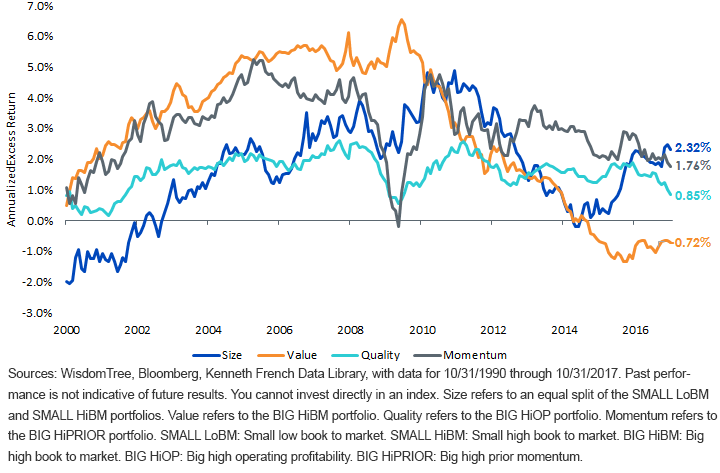
A few weeks ago, we looked at the current state of affairs in smart beta factors in the U.S. markets. With flows into U.S. smart beta stock ETFs in recent years, we found that there was a reduced, but not eliminated, effectiveness with a factor-based approach.
Many investors see international equity markets as generally less efficient than U.S. markets, and as such, we wanted to see if factors have a greater propensity to outperform the broad market outside the U.S.
Rolling 10-Year Annualized Excess Returns vs. MSCI EAFE

International Factors: Larger Excess Performance than U.S. Factors
Over the last 10 years, the size, quality and momentum factors have generated strong excess returns compared to the MSCI EAFE Index. Echoing what we saw in the U.S., the value factor is in the midst of its worst relative performance in its (albeit shorter) history.
An important takeaway we found was that for the international size, value and momentum factors, their excess performance over the last 10 years was greater than what we found from their U.S. counterparts (and the international quality factor, although having slightly less robust outperformance than the U.S. quality factor, still managed to outperform the MSCI EAFE Index on every rolling 10-year time frame).
To us, this has massive implications: that a factor-based approach may be even more effective at outperforming cap-weighted indexes in international markets than in U.S. markets.
Size on the Rise
Interestingly, the size factor has seen its excess performance spike upward in recent years. When we review investors’ portfolios, we typically see many who already allocate to U.S. small caps. However, it is far less frequent that we find international small caps, from either developed or emerging markets. Given how much value small caps can add to a portfolio, we fully advocate for their inclusion where appropriate. That said, when it comes to small caps, we always prefer a discretionary approach.
















